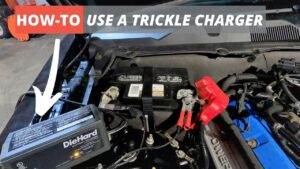Can a bad alternator ruin a battery? The answer is a resounding yes. If you’ve ever experienced a dead or constantly draining battery, a faulty alternator could very well be the culprit. Your car’s alternator is responsible for keeping the battery charged while the engine is running. However, when the alternator malfunctions, it fails to provide a steady stream of power, leading to a drained battery. In this article, we’ll delve into the ins and outs of this issue, exploring the reasons behind it and offering practical solutions. So let’s jump right in and shed some light on the question: can a bad alternator ruin a battery?
Can a Bad Alternator Ruin a Battery?
If you’ve ever experienced a dead car battery, you know how frustrating it can be. The last thing you want is to be stranded with a vehicle that won’t start. One possible culprit for a dead battery is a bad alternator. In this article, we’ll delve into the relationship between a bad alternator and a battery, exploring how a faulty alternator can impact the health and lifespan of your battery.
Understanding the Alternator
Before we dive into the impact of a bad alternator on a battery, it’s essential to have a basic understanding of what an alternator does in a vehicle’s electrical system. The alternator is responsible for generating electricity while the engine is running. It keeps the battery charged and powers all the electrical components of the car, such as the lights, radio, and air conditioning.
The alternator works in conjunction with the battery to supply power to the vehicle. While the battery provides the initial power to start the engine, the alternator takes over once the engine is running, continuously recharging the battery and providing electricity to the various electrical systems.
The Battery-Charging Process
To better understand how a bad alternator can impact a battery, let’s explore the battery-charging process in more detail.
1. Battery Power: When you start your vehicle, the battery supplies the initial electrical power needed to turn the engine over.
2. Alternator Takes Over: Once the engine starts, the alternator begins generating electricity. It converts mechanical energy from the engine into electrical energy, which it then uses to power the vehicle’s electrical systems and recharge the battery.
3. Charge Distribution: The alternator distributes electrical power to both the vehicle’s electrical systems and the battery. It ensures that the battery remains charged while simultaneously meeting the energy demands of other components.
4. Battery Recharge: As the alternator supplies electricity to the battery, it recharges it to ensure it remains fully operational for the next engine start.
Diagnosing a Bad Alternator
Now that we have a better understanding of the alternator’s role in charging the battery, let’s explore how to diagnose a bad alternator. Here are a few signs that may indicate a faulty alternator:
- Dimming Lights: If you notice the headlights or interior lights dimming while driving, it could be a sign of a failing alternator.
- Warning Light: The battery or alternator warning light on your vehicle’s dashboard illuminates when there’s an issue with the charging system.
- Electrical Issues: The alternator’s failure can cause various electrical problems, such as a malfunctioning radio, power windows, or difficulty starting the vehicle.
- Battery Issues: If you experience frequent battery failures, it could be a result of a bad alternator not properly recharging the battery.
- Strange Noises: Unusual grinding or whining noises coming from the engine may indicate a worn-out alternator.
If you suspect a problem with your alternator, it’s crucial to have it inspected and repaired promptly to prevent further damage to your battery.
The Impact of a Bad Alternator on the Battery
Now, let’s discuss how a bad alternator can ruin a battery and negatively impact its overall performance.
1. Insufficient Charging: A faulty alternator may fail to provide adequate charging to the battery. This leads to a gradual loss of battery power, eventually resulting in a dead battery. If the alternator isn’t supplying enough power, the battery will not be properly recharged after each use, reducing its overall capacity.
2. Overcharging: On the other hand, a malfunctioning alternator can also overcharge the battery. This occurs when the alternator produces excessive voltage, causing the battery to become overworked and potentially damaging its internal components. Overcharging can lead to battery failure and significantly shorten its lifespan.
3. Parasitic Drain: In some cases, a bad alternator can cause a parasitic drain on the battery. This drain occurs when an electrical component or circuit continues to draw power from the battery even when the vehicle is turned off. A faulty alternator can contribute to this drain, gradually depleting the battery’s charge and potentially rendering it useless.
4. Straining the Battery: When an alternator is not functioning correctly, the battery may be forced to compensate for the lack of charging. This puts added strain on the battery, making it work harder to supply power to the electrical systems. The excessive load can cause the battery to degrade faster and reduce its overall lifespan.
Preventing Battery Damage
To avoid a bad alternator ruining your battery and experiencing unexpected breakdowns, it’s important to take proactive steps in maintaining your vehicle’s electrical system. Here are some tips to prevent battery damage:
- Regular Maintenance: Follow the manufacturer’s recommended maintenance schedule for your vehicle. This includes inspecting and servicing the alternator and battery as necessary.
- Inspection and Testing: Periodically inspect the alternator for any visible signs of damage or wear. Additionally, have a professional test the alternator’s output to ensure it’s functioning correctly.
- Battery Maintenance: Keep the battery clean and free of corrosion. Check the battery terminals regularly and tighten any loose connections.
- Avoid Excessive Electrical Use: Minimize the use of electrical components when the engine is not running. This reduces the load on the battery and alternator.
- Address Issues Promptly: If you notice any signs of alternator or battery problems, address them promptly to prevent further damage. Ignoring the early warning signs can lead to more severe issues and costly repairs.
By following these preventive measures, you can prolong the life of both your alternator and the battery, ensuring your vehicle operates smoothly and reliably.
With a better understanding of the relationship between a bad alternator and a battery, you can now recognize the signs of a failing alternator and take appropriate action. Regular maintenance and prompt repairs are essential to avoid battery damage and prevent unexpected breakdowns. By staying proactive, you can keep your vehicle’s electrical system in excellent condition and enjoy worry-free driving.
Frequently Asked Questions
Can a bad alternator ruin a battery?
Yes, a bad alternator can indeed ruin a battery if it is not properly functioning. The alternator is responsible for charging the battery while the engine is running and supplying power to the electrical components of the vehicle. If the alternator is faulty, it may not provide sufficient charge to the battery, causing it to drain. Over time, the repeated draining and recharging can lead to a shortened battery lifespan and eventually ruin the battery.
How can a bad alternator affect a battery?
A bad alternator can have several negative effects on a battery. Firstly, it may not provide enough charging voltage to replenish the battery’s power, leading to a gradual loss of charge. This can result in a weakened battery that struggles to start the vehicle or power electrical components. Additionally, a faulty alternator can generate irregular voltage spikes or surges, which can damage the battery and reduce its overall lifespan.
What are the signs of a bad alternator affecting the battery?
There are several signs that indicate a bad alternator is affecting the battery. These signs may include dimming headlights or interior lights, a warning light on the dashboard indicating a charging system problem, difficulty starting the vehicle, a dead battery, or the need to jump-start the car frequently. If you experience any of these symptoms, it is recommended to have your alternator and battery checked by a professional mechanic.
Can a bad alternator drain a new battery?
Yes, a bad alternator can drain a new battery. While a new battery may have a higher capacity to hold a charge, it still relies on the alternator to provide a continuous supply of power. If the alternator is faulty, it may not charge the new battery properly, leading to its gradual depletion. It is important to address any alternator issues promptly to protect the lifespan of a new battery.
What should I do if my alternator is ruining the battery?
If you suspect that your alternator is ruining the battery, it is recommended to have your vehicle inspected by a qualified mechanic. They can perform diagnostic tests to determine the exact cause of the problem. Depending on the severity of the alternator issue, it may need to be repaired or replaced. It is also advisable to have the battery tested to assess if it has been damaged and requires replacement as well.
Final Thoughts
A bad alternator can indeed ruin a battery. When an alternator malfunctions, it fails to charge the battery properly, resulting in a gradual loss of power. Without a sufficient charge, the battery starts to drain quickly, leading to decreased performance and potential failure. This can leave you stranded with a dead battery and in need of a replacement. It is essential to address any issues with the alternator promptly to avoid further damage to the battery. A bad alternator’s impact on a battery’s health cannot be overlooked, making regular maintenance and inspections crucial for optimal performance.


